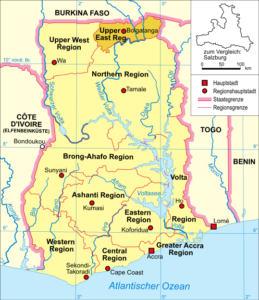
Accra, March 1, 2018//-Ghana has confirmed a case of Lassa fever (LF) at Tema Metropolis, Greater Accra Region.
On 23rd February 2018, a 26-year old man was rushed to the Tema General Hospital (TGH) with general body weakness, severe headache, joint pains, profuse vomiting of blood with clots. The symptoms started on the 22nd February, 2018. He vomited blood with clots on admission.
The patient had come from Kintampo North District in the Brong Ahafo Region about a few weeks ago to Tema. Within the three-week period, he also travelled to Eastern, Volta and the Brong-Ahafo Regions.
He was suddenly taken ill on 22nd February 2018 and he reported to Tema General Hospital on the 23rd of February after the symptoms had worsened and was admitted. The patient was seen at the Emergency Unit of the hospital and resuscitation and further investigations were started.
Blood sample was taken and sent to Noguchi Memorial Institute for Medical Research (NMIMR) for laboratory investigation and confirmed Lassa fever. The patient was managed in the isolation unit and was later moved to the Infectious Disease Centre (IDC) at Tema General Hospital. Patient’s condition improved for a while and started deteriorating on the night of 27th February. Unfortunately, he died at the early hours of 28th February.
Actions Taken by the Ghana Health Service / Ministry of Health
- Safe and dignifying burial has been done under supervision and support of trained professionals.
- Enhance surveillance including Points of Entry (POEs) Surveillance with screening at the respective POEs
- Contact tracing and follow up process have been initiated
- Regional and districts health facilities have been informed about the outbreak
- Media sensitization and public education started about 2 weeks ago and is still ongoing, following the alert from the outbreak in Nigeria early this year.
- Sensitization of staff on Lassa Fever (Prevention, Case Management, Standard Precautionary Measures, Barrier Nursing) has been initiated and it is ongoing.
- Initiated process to mobilize and stockpile essential logistics such as drugs and Personal Protecting Equipment (PPE).
- Public Health Emergency Management Committees (PHEMCs) at all levels (National, Regions and Districts) have been activated.
- The Ghana National Technical Coordinating Committee (NTCC) which is multisectoral and multidisciplinary has been activated and met to discuss response activities for containment.
We appeal to the general public to adhere to actions towards prevention and protection against further spread of the disease as per information sheet on the disease attached.
GENERAL INFORMATION ON LASSA FEVER
Lassa fever is an acute viral infectious disease which is endemic in West Africa. The disease is gradual in onset with non-specific signs and symptoms. About 80% of infections are mild or without symptoms, however the disease can be severe and fatal. The incubation period is between 2-21 days. Ghana had earlier in 2011 confirmed few cases Lassa fever in Ashanti and Eastern regions.
SIGNS AND SYMPTOMS
- Early symptoms include: fever, general weakness, and malaise.
- After a few days, headache, sore throat, muscle pain, chest pain, nausea, vomiting, diarrhoea, cough, and abdominal pain may follow.
- In severe cases facial swelling, fluid in the lung cavity, bleeding tendencies (from the mouth, nose, vagina or gastrointestinal tract). This may result in low blood pressure and shock.
- Late presentation may include shock, convulsion, disorientation, coma, multiple organ failure,
- Complications during recovery include permanent hearing loss (30% of cases); transient hair loss; and gait disturbance during recovery
- The disease may present like Ebola, Yellow fever, Malaria, Typhoid fever, Respiratory Tract Infections, Ear, Nose and Throat Infections etc.
How does Lassa fever spread?
- Lassa fever is transmitted to humans through contact with the urine, saliva, faeces and blood of rodents. The disease is endemic in rodent population in parts of West Africa. The reservoir for the virus is “multi-mammate rat”.
- Person to person transmission through direct physical contact with body fluids like blood, saliva, stool, vomitus, urine, and sweat of infected person and soiled linen used by a patient.
- Sharp instruments such as needles that have been used by an infected person
- Non-professional handling of persons who have died of Lassa fever
Can Lassa fever be treatment?
There is an effective drug for treatment if reported early to a health facility/centre.
How can Lassa fever be prevented?
- No human vaccine against Lassa fever. Raising awareness of the risk factors of the disease and the protective measures individuals can take is the only way to reduce human infection and death.
- Promoting good “community hygiene” in order to discourage rodents from entering home
- Storing grains and other food stuffs in rodent-proof containers
- Disposal of garbage should be far from the home
- Maintaining clean households and keeping cats to scare rodents away
- Family members should avoid contacts with blood and body fluids while caring for the sick
- Burial of death from Lassa fever should be done by trained persons
For more information:
- Dr. Badu Sarkodie; Director of Public Health, GHS (0244417911)
- Dr. Franklin Asiedu-Bekoe; Deputy Dir (PH) & Head, Disease Surveillance Dept, GHS (0244643142)
- Mrs. Rebecca Ackwonu – Head of Public Relations Unit, GHS (0208118787)
- Robert Cudjoe, Head of PR Unit, MOH (0245877340 or 0249955605
ISSUED BY THE MINISTRY OF HEALTH/GHANA HEALTH SERVICE
African Eye Report


